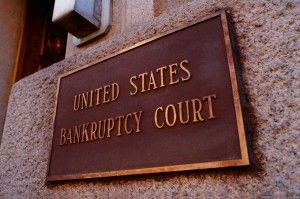Judge: CalPERS not protected in Stockton bankruptcy
by James Poulos | October 8, 2014 11:55 am
 After a brief reprieve from a bad summer, the California Public Employees Retirement System has been handed another massive setback.
After a brief reprieve from a bad summer, the California Public Employees Retirement System has been handed another massive setback.
In a provisional but uncompromising ruling, U.S. Bankruptcy Judge Christopher Klein held bankrutpcy law does not permit CalPERS to protect its workers’ pensions[1] even when municipal coffers run dry.
An end to business as usual
Typically in federal bankruptcy proceedings, the judge has almost total discretion to dispose of assets and restructure contracts. But CalPERS, reported[2] Bloomberg Businessweek, “has long argued successfully that California law provides extra protection for public pensions when a city struggles financially, allowing Calpers to use special liens to force cities to pay up.”
Such liens have been one of CalPERS’ most powerful weapons in the face of potential bankruptcies. According[3] to The Wall Street Journal, the particular lien CalPERS demanded from Stockton has reached an eye-popping amount. In the event Stockton defaults on its pension contract with its public workers, CalPERS said, the fund will see a $1.6 billion “termination fee.”
Klein, reported Bloomberg Businessweek, called the unique law a “golden handcuff” that “is simply invalid in [the] face of the U.S. Constitution.” But his ruling was verbal, not written, and its practical impact will hinge on whether Stockton proposes — and the judge accepts at the end of the month — a restructuring plan that does not slash public pensions.
National attention, national stakes
On the other hand, even Klein’s incomplete decision made for a landmark ruling in California, with important implications nationwide. As the Sacramento Bee observed[4], Wall Street analysts hailed the ruling, which rebuffed CalPERS claims that Detroit’s municipal bankruptcy proceeding should not have been considered a precedent because Michigan lacks the Golden State’s additional pro-pension legislation. Moody’s Investors Service, reported the Bee, called Klein’s holding “a positive sign for investors that pension obligations will not be given preferential treatment over debt” in a city’s financial restructuring.
The financial and investment industry has watched Stockton’s case carefully. What happens there could not only affect future city bankruptcies in California, but influence the scope of legal remedies against public employee unions across the country. Where pension funds have been protected, the pressure on creditors, taxpayers and shareholders has increased substantially.
As the Journal detailed, Stockton’s bankruptcy took a painful toll on virtually every other major financial player in town. “The city last year raised its sales tax by 0.75% to cover rising labor costs and hire more police,” the paper wrote. “Creditors are taking big haircuts. Assured Guaranty, which insures about $121 million in pension obligation bonds, will recover about 50%. Franklin Templeton Investments has been offered a penny on the dollar for $35 million in bonds for public works.”
More embarrassment
At the same time as CalPERS has struggled to advance its claims in court, its public image has taken another slam on an unrelated matter. After being hit with over $10,000 in fines for years of filing and disclosure violations, CalPERS board member Priya Mathur recently incurred the wrath of the California Fair Political Practices Commission.
That body is poised to slap Mathur with another $4,000 in fines, quadruple the originally agreed-to amount. CalPERS had already stripped[5] Mathur of her chair on the health committee and suspended her travel privileges. But, as the Los Angeles Times reported[6], members of the agencies making up the CalPERS system voted last week to return Mathur to a fourth four-year term in office.
More troubles
What’s more, in August an irate Gov. Jerry Brown ordered state Controller John Chiang’s office to investigate what his administration could do to “protect the integrity” of a law meant to prevent pension spiking.
In September, Chiang revealed[7] California lacks the resources to oversee and crack down the spiking, which involves deliberately boosting work that counts toward union members’ retirement packages. The practice increases costs to CalPERS and reduces its fiscal solvency.
- bankrutpcy law does not permit CalPERS to protect its workers’ pensions: http://www.sacbee.com/2014/10/01/6752346/calpers-bankruptcy-stockton.html
- reported: http://www.businessweek.com/articles/2014-10-02/pensions-arent-sacred-a-judge-tells-calpers
- According: http://online.wsj.com/articles/a-calpers-comeuppance-1412636241
- observed: http://www.sacbee.com/2014/10/01/6752346/calpers-bankruptcy-stockton.html
- stripped: http://calwatchdog.com/2014/08/27/brown-hits-calpers-on-pension-spiking/
- reported: http://www.latimes.com/business/la-fi-calpers-ethics-20141007-story.html
- revealed: http://calwatchdog.com/2014/09/13/controller-no-calpers-controls-on-pension-spiking/
Source URL: https://calwatchdog.com/2014/10/08/judge-calpers-not-protected-in-stockton-bankruptcy/